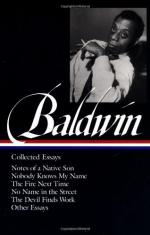|
This section contains 1,122 words (approx. 4 pages at 300 words per page) |

|
In his famous essay, "Everybody's Protest Novel," published in Partisan Review in 1949, when he was only twenty-four, Baldwin announced his determination to reject the pattern of protest that a Negro writer in America was expected to follow. Instead of depicting the black man as "merely a member of a Society or a Group" who has been condemned by the white oppressors to poverty and ignorance, Baldwin chose to understand him as "something resolutely indefinable, unpredictable." (p. 73)
In that bold refusal to be manacled to the racial shibboleths of the "protest novel," Baldwin even felt free, during his expatriate years in France, to write a novel about white homosexuals, Giovanni's Room, in the first person, if only to prove that he could do without the black-and-white chessboard on which black fiction played out its predictable despair. Yet Giovanni's Room was an act of bravura, not an interesting novel. Baldwin's...
|
This section contains 1,122 words (approx. 4 pages at 300 words per page) |

|


